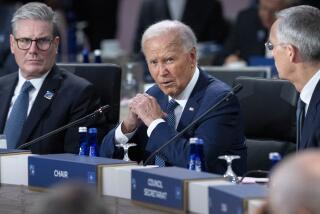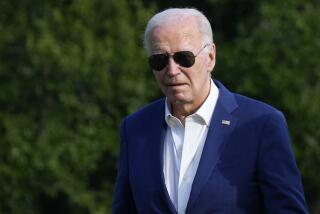Bush Shows Strain of His Go-Go Pace : Health: He appears tired as he arrives in London. His doctor hopes he will slow down.
- Share via
LONDON — Still fighting the debilitating effects of his thyroid medication, George Bush has begun to show physical signs of the strain imposed by the burdens of his office and the nonstop, go-go pace he has made a hallmark of his presidency.
He appeared tired and drawn as he arrived in London on Sunday for the annual economic summit meeting of leading industrial nations and the beginning of an intensive period of diplomatic meetings that will deal with such demanding issues as arms control, U.S.-Soviet relations and liberalization of world trade.
The mountain of official business on his plate is daunting enough, but the President continually adds to the burden: On the eve of the trip that will take him from London and France to Greece and Turkey in nine days, he was on the Kennebunkport golf course by 6:10 a.m. last Saturday--proudly racing through 18 holes in one hour, 24 minutes and 37 seconds.
“I want to get this over early,” he said, “get the boat over early, get the tennis over early. ‘Cause we’ve got a lot of work. Maybe running today.”
“He is compulsive about it,” said one Washington associate who has watched Bush closely for the past decade.
White House officials say Bush handles all the pressure well, but they acknowledge that his thyroid medication still makes him tired. And the new questions raised about his choice to head the CIA, Robert M. Gates, have become a fresh source of strain. Officials say Bush has become extremely angry over the issue.
Also, the President’s doctor, Burton J. Lee III, often expresses the almost-wistful hope that his 67-year-old patient will slow down.
But there seems to be no place for that in Bush’s vision of his role.
In London, he is immersed in the final push for a nuclear arms reduction treaty with the Soviet Union, the global economic issues being considered with the leaders of Britain, Canada, France, Germany, Italy and Japan--and, on Wednesday, he is scheduled to spend at least six hours in meetings with Soviet President Mikhail S. Gorbachev and hold two news conferences. His day will not end until 11 p.m., after his second dinner in four days at 10 Downing St.
Eight and a half hours later, the President will be on the move again--heading east on whirlwind visits to Athens, Crete, Ankara and Istanbul before returning to Washington four days later.
As he travels, Bush is juggling developments in the Arab-Israeli peace process, the struggle to eliminate Iraqi President Saddam Hussein’s nuclear weapons program, the stalled world trade talks and a host of other issues.
The present trip is almost certain to be followed in close succession by a Moscow summit, another allied summit in Rome, a fast-paced tour of Asia and a visit to Hawaii for the 50th anniversary of the attack on Pearl Harbor.
And, even as he travels through Europe, Bush is monitoring such domestic issues as the skirmishes in Congress over Gates and questions raised about his role in the Iran-Contra affair, and those over Clarence Thomas, his nominee for the Supreme Court.
“How long can he keep this up--the pace, the schedule? I don’t know,” said one former aide. “I imagine he has a good sense of himself and how tired he is.”
Still, the pace of the work has become a challenge that Bush seems to relish, just as he seems determined to race about on a vacation day squeezing in golf, boating, tennis, running.
In London on Monday, he could tick off a morning of appointments that included Germany’s Helmut Kohl, Italian Prime Minister Giulio Andreotti and European Commission President Jacques Delors, while reports poured in from the Middle East and aides debated the next step in the U.S.-Soviet arms talks.
“He loves those situations. He excels at being able to handle a lot of balls in the air,” the former aide said, adding:
“He is exhilarated by challenge and the inherent possibility of achievement in any situation. I think he honestly believes there is no problem that is insoluble.”
To meld the pace with the challenge, Bush lives by a tight discipline. It is not readily apparent to outsiders, but those close to him say it is evidenced by such behavior as keeping briefings short whenever possible and a determination to squeeze catnaps into his daily regimen.
His pride in standing up to the rigors of his job was seen one day on a similarly tiring overseas trip when he came upon an obviously exhausted aide roughly half his age. With a glint in his eye, Bush said teasingly, “Looking pretty tired.”
Even before the current journey began, Bush, uncharacteristically, acknowledged in an open letter to journalists traveling with him that it would be “perhaps exhausting.” It was a rare admission for a man who takes pride in being up to any challenge.
Then, looking more like someone who had just completed the wearying journey he was actually beginning, he embarked on the present trip.
“The doctors still say he’s in good shape. To us there’s no clear indication he’s more tired than you would expect with the medication he’s taking, and the medicine does make him tired. But as time goes by that diminishes,” said White House Press Secretary Marlin Fitzwater.
Bush began daily doses of a synthetic thyroid hormone a week ago, to replace the hormone that had been produced by his overactive thyroid gland. The gland was destroyed by a dose of radioactive iodine, after it was determined that it was responsible for the irregular heartbeat that caused his hospitalization in early May.
Originally, the President’s European trip had been scheduled to begin with a daylight flight to London on Sunday. But at the last minute, Bush decided to squeeze in a meeting in Rambouillet, France, 30 miles west of Paris, with French President Francois Mitterrand on Sunday afternoon, necessitating an overnight journey Saturday night.
But Bush slept well on his spacious new Air Force One, a Boeing 747 jumbo jet with a full bed and shower, and he declared, “I feel good,” when he awoke, Fitzwater said.
Seeking to explain Bush’s pace and the lengths to which he goes to cram as much as he can into any 24-hour period, the former aide said:
“I think there’s an odd mixture or odd situation for someone who has such a demanding schedule. You’re all the more jealous about guarding personal time for athletic activities or things like that that you enjoy. Whenever you see a break, you take it.
“Physical activity has always been important to him. But it’s not just the physical side. It offers him a psychological relaxation,” he said. “Age may be a factor, too. Sports is a connection with his youth.”
More to Read
Get the L.A. Times Politics newsletter
Deeply reported insights into legislation, politics and policy from Sacramento, Washington and beyond. In your inbox twice per week.
You may occasionally receive promotional content from the Los Angeles Times.










